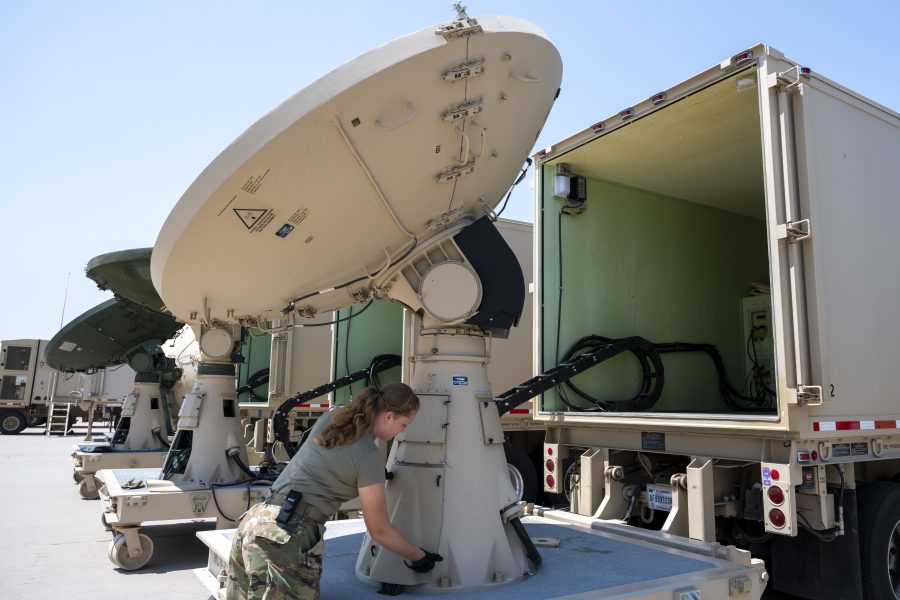Governors from nearly every U.S. state and territory signed a letter sent to Defense Secretary Lloyd J. Austin III on April 29 asking him to withdraw an Air Force proposal to transfer Air National Guard units to the Space Force.
While the letter does not endorse the creation of a separate Space National Guard, it does mark a clear pushback against Department of the Air Force plans to move all its space professionals into one service component. All told, the letter has 53 signatories—48 state governors, and five governors of territories. Only the leaders of Florida and Texas did not sign.
The Air Force proposal, submitted to Congress this spring, would waive federal law requiring “no change in the branch, organization, or allotment of a [Guard] unit located entirely within a state may be made without the approval of its governor.”
The proposal “disregards gubernatorial authorities regarding the National Guard and undermines over 100 years of precedent as well as national security and military readiness,” the governors’ letter states.
Air Force Secretary Frank Kendall has argued the move would not weaken governors’ control over their Guard units because the situation is a unique one-off, affecting a tiny portion of the Guard’s personnel. There are approximately 14 space units in seven states with 1,000 Air National Guardsmen. The Army and Air National Guard combined have more than 430,000 personnel with hundreds of units.
“We’re talking about a few hundred people,” Kendall told reporters April 10. “The numbers for any state are less than, I think, 2 percent of their Guard people and there are only a handful of states are affected.”
But the 53 governors—most of whom do not have any space units in their Guard—argued that the move would carry wider implications.
“Legislation that sidesteps, eliminates, or otherwise reduces governors’ authority within their states and territories undermines long-standing partnerships, precedence, military readiness and operational efficacy,” they wrote. “This action also negatively affects the important relationships between governors and DOD at a time when we need to have full trust and confidence between the two to meet the growing threats posed by the era of strategic competition as well as natural disasters.”
Of the two states that did not sign the letter, Florida has space Guard units, while Texas does not.
The debate over the space-focused Guard units has been raging for years now.
Proponents of a Space National Guard say the Air National Guard units who do space missions are “orphaned” under the current arrangement, that creating a separate Space Guard would mostly be an administrative move with few costs, and that Guard members want to remain available for state-level missions like humanitarian relief or natural disaster response.
Kendall, other Department of the Air Force leaders, and the White House have argued a separate Guard would create unnecessary and costly bureaucracy and that space is inherently a federal mission, so Guards have no need for space units. Recent legislation allows the Space Force to have part-time personnel, and leaders say that unique setup will ease the transition for Guard members.
A third option is to leave the Air National Guard units as they are, with minimal changes to better formalize their relationships with the Space Force.
Congress directed the Air Force to study all three options and deliver a report with recommendations by March 1. Kendall said April 10 that the report will be delivered soon but the results were clear: folding Guard units into the Space Force is the preferred solution; creating a separate Space National Guard would be the worst option.
“It doesn’t make any sense,” Kendall argued. “It’s going to cost to administer. There is not in my mind, any expectation that it will grow. And it’s going to be administratively difficult. So I don’t think that that’s a very attractive option for a number of reasons.”
While the vast majority of governors disagree with Kendall, what Congress will do remains unclear. Seventeen senators have cosponsored a bill that would create a Space National Guard. Corresponding legislation in the House also garnered 17 cosponsors.
However, at least one influential lawmaker is on Kendall’s side: Rep. Mike Rogers (R-Ala.), chair of the House Armed Services Committee. According to a report from Breaking Defense, Rogers said he was “fully supportive” of the Air Force proposal.
The issue is likely to come up again in the 2025 National Defense Authorization Act—the Senate Armed Services Committee is scheduled to begin work on the annual policy bill in June.
